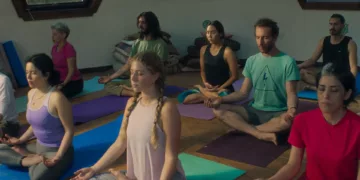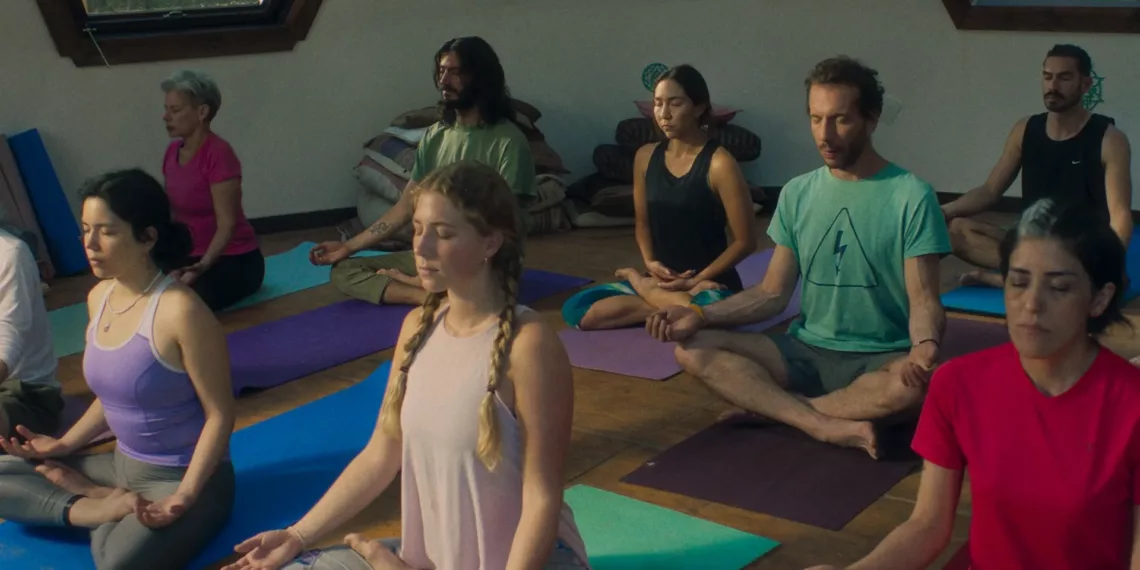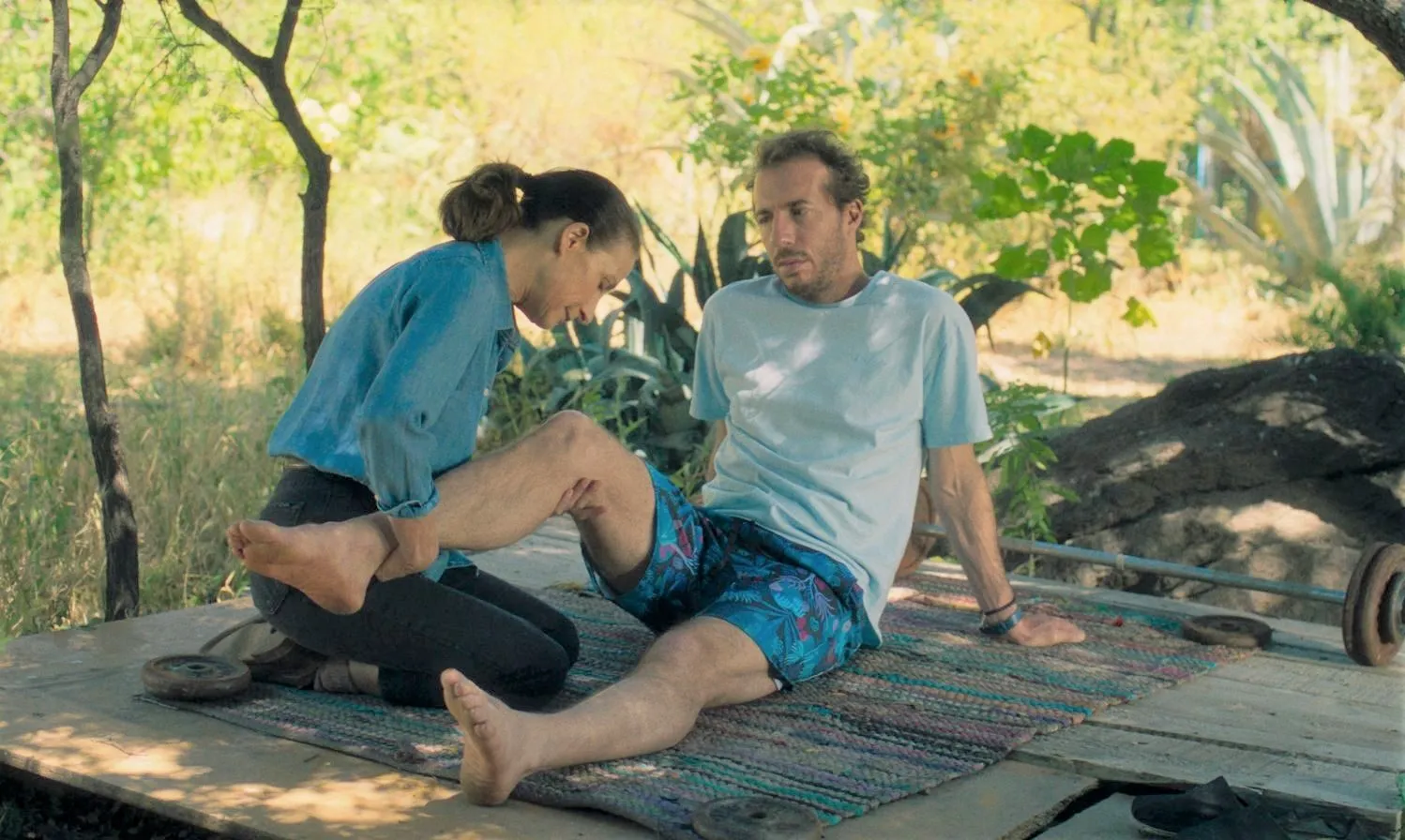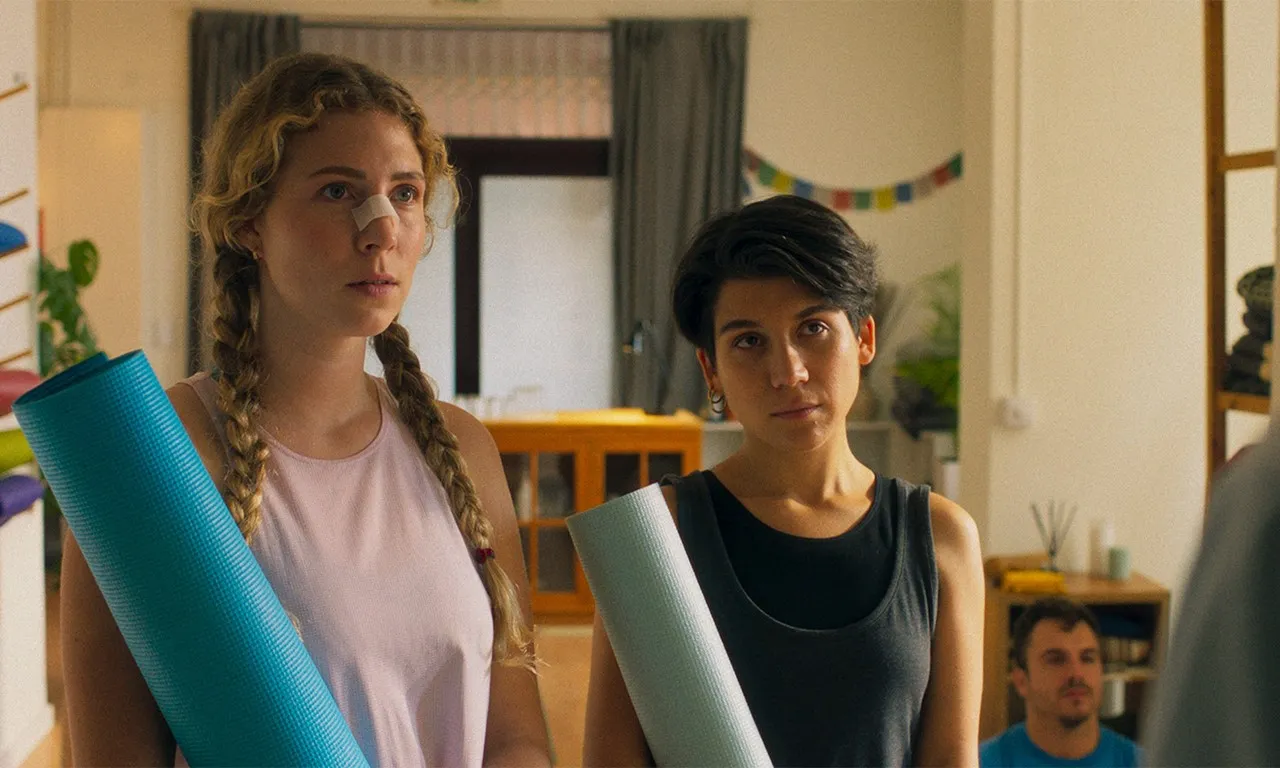Martin Rejtman is an acclaimed Argentine director known for his absurdist comedies and observational style. Throughout his career spanning three decades, he’s crafted films that illuminate the quirky dilemmas and interactions of everyday people. In Rejtman’s skilled hands, ordinary lives become a showcase for both laughter and melancholy introspection.
His latest film, The Practice, focuses on Gustavo, a yoga instructor living in Chile who’s recently separated from his wife Vanesa. As Gustavo struggles to find stability in the aftermath of divorce, a string of bizarre mishaps piles even more chaos onto his life. When an earthquake causes an accident at his class, a knee injury waylays his teaching, and a suspected theft rattles his studio, it’s clear the universe has no sympathy for Gustavo’s fragility.
Amidst the unpredictability, Rejtman infuses the story with his trademark dry wit. Through deft comedic timing and extended visual gags, subtle humor emerges from situations that could otherwise feel overly serious. Under the laughs, viewers glimpse deeper reflections on modern society’s fixation with wellness as a cure-all.
As Gustavo discovers, sometimes breaking routine is key to truly stretching yourself—whether emotionally or physically. With this insightful film, Rejtman proves once more that under his guidance, even life’s absurd ups and downs can be both entertaining and thought-provoking.
The Central Figures
In The Practice, we meet Gustavo Barreneche, an Argentine who has made his home in Chile as a yoga instructor. But Gustavo finds himself in tumult, as he’s recently separated from his wife Vanesa, whom he owned a studio with.
The divorce hasn’t been kind to Gustavo. Where Vanesa demonstrates resilience, Gustavo struggles to find stability without her. Still, he keeps the studio while Vanesa claims their shared apartment. Staying with his critical sister Macarena and brother-in-law Felipe offers Gustavo no refuge either.
Played with delectable deadpan by Esteban Bigliardi, Gustavo drifts in a state of anxious calm. Though surrounded daily by wellness, inner peace evades him. From an earthquake mishap to a student suspected of theft, Gustavo reels from one strange situation to the next. Nothing seems right—not his injured knee nor the therapist offering pills, not the chance meeting with old flame Laura.
We see Gustavo’s overwhelmed psyche reflected in Rejtman’s deliberately static shots and Bigliardi’s nuanced face, clinging to routine yet unsure what he grasps for. A fish-out-of-water in his own life, Gustavo inspires both sympathy and humor in equal measure.
Vanesa, played vibrantly by Manuela Oyarzun, models resilience as she takes their breakup in stride. Keeping their apartment, she teaches smaller classes yet ventures to find romance, testing a connection with biker Rodrigo. Though apart, she and Gustavo share a therapist, played by the detached Catalina Saavedra, whose sessions hilariously worsen their strife.
Supporting figures like Gustavo’s accusing family, the accident-prone German student Steffi, and the guru-like retreat leader all enhance the comedic fishbowl effect. Under Rejtman’s tender eye, these colorful souls demonstrate how everyday chaos, as much as well-meaning control, plagues the pursuit of peace within.
Rejtman’s Subtle Directorial Touch
Martín Rejtman brings a very distinctive style to crafting comedy in The Practice. He favors long, static takes and deadpan delivery that may seem subtle but lend themselves brilliantly to absurdist humor.
Rejtman lets scenarios unfold at a relaxed pace, shooting mainly from a fixed position to simply observe the action. We see this when Gustavo endures appointments with his lackluster therapist or family dinners where criticisms relent. There’s none of the rapid-cutting or swelling music that usually dramatizes such scenes. This detached approach gives the absurdity room to emerge naturally.
The dialogue captured within these extended shots feels notably lacking in emotion. Characters state comments, complaints, or concerns in a calm, bland manner regardless of content. It’s this juxtaposition of delivery and subject matter that renders even the most cringe-worthy lines laugh-out-loud funny.
Certain ongoing jokes or callbacks are drawn out with expert timing too. Gustavo faces repeated mishaps with his bum knee, each fall eliciting pained sympathy along with knowing chuckles. And one therapist session deteriorates so gradually into pointless pill-pushing it’s like watching a car crash in slow-mo.
Yet for all the humor, a pervasive melancholy lingers beneath. Even during rare smiles, a brooding atmosphere stays intact. Though aiming for calm and clarity, Gustavo and others appear profoundly unsettled. Their emotional suppression, per Rejtman’s wise direction, only heightens our sense of lives quietly imploding.
By balancing dry wit with deeper realism, Rejtman proves comedy can offer more than fleeting joy. At their most absurd, his scenes reflect universal struggles in a truly thoughtful, original way.
Rejtman’s Unrushed, Absurdist Vision
I’ve got to give it to Rejtman – the man knows how to craft a peculiar story. The Practice plays out like Gustavo’s scattered thoughts, hopping among brief scenes with sparse narration to tie them together.
We follow Gustavo as if shadowing him throughout an odd day. One moment he’s teaching yoga, then dining with family, after winding up with a student at night. It’s disorienting but honest to how a mind feels post-breakup.
I appreciated that Rejtman lets moments breathe, simply observing the oddities through languid camerawork. Comedy emerges from the most mundane of interactions allowed to unfold at length. Even laugh-out-loud moments are tapered to prolong their full effect.
The end result feels uncannily real. Gustavo’s life has gone off the deep end, yet Rejtman maintains a calm, curiously empathetic tone. His assured direction finds poetry in the mundane and absurdity in any situation.
The leisurely pace perfectly serves comedic timing too. Jokes are set up to simmer before paying off, preventing any rushed, over-explanations. Scenes loop back for callbacks just when humor risks growing stale.
All in all, it’s an unorthodox storytelling triumph that left me strangely moved. Rejtman demonstrates how the simplest sequences, granted space to develop, reveal universal truths in even life’s most nonsensical phases.
A Wry Exploration of Modern Angst
The Practice has plenty to say about the issues plaguing us today. Rejtman shines a light on society’s wellness fixation and how easily it can become another source of stress.
Throughout the film, characters face one physical or mental hindrance after another, from yoga injuries to dysfunctional therapy sessions. They exhibit a strong need to constantly work on themselves, yet seem unlikely to find what they seek.
Gustavo’s life has the most pointed critique. As a yoga instructor, his career centers on promoting inner and outer wellbeing. But after his divorce, that all falls to pieces. Despite his routines, Gustavo seems less grounded than before, losing direction as even passion becomes routine.
In a sense, Rejtman suggests our endless chasing after “better” versions of ourselves may do more harm than good. Constantly striving for change often misses the value in accepting life as it is. And prioritizing how we look or feel risks overlooking our essential humanity.
Their stone-faced manner shows a disconnection from simple joys too. While aspiring for happiness, have we killed our ability to find contentment in each moment? By obsessively defining worth through goals and milestones, have we robbed life of meaning along the way?
Through wit and empathy, Rejtman poses just questions about modern conditions seldom articulated so insightfully. The Practice is a wise, welcoming guide through this absurd yet recognizable world we’ve made. In Gustavo’s calm eyes, our own neuroses and doubts are reflected back to see, gently encouraging perspective over perfection.
Rejtman’s Stripped-Down Vision Comes to Life
Through his finely-tuned direction, Rejtman brings Gustavo’s world to vivid, nuanced life. Filmed almost exclusively within intimate interiors, The Practice observes its characters with quietly piercing accuracy.
Rejtman favors sparse, static compositions that breathe realism into even the most absurd scenarios. From therapy sessions to family meals, locations feel authentic, capturing emotional atmospheres through glance and gesture.
Above all, the rundown apartment and yoga studio encapsulating Gustavo’s unsteadiness feel tangible. Within these rooms, humor plays on faces and furnishings with impeccable comedic timing.
It’s a credit to Rejtman and his production team that such depth emerges from such sparseness. Each frame tells stories through perceptive placement of everyday detail.
Then there’s Esteban Bigliardi’s wonderfully understated lead work. As Gustavo drifts in his own unease, Bigliardi anchors us with him, expressing volumes through stillness. We feel this man’s disconnect and root for his journey, all within subtle gestures.
Together, Rejtman’s vision and Bigliardi’s performance make Gustavo’s Chilean surroundings feel as familiar as our own. The Practice taps universal themes by localizing them for us through its beautifully controlled, stripped-back craft.
Rejtman’s Absurdist Vision Resonates
Through his masterful guidance of The Practice, Rejtman has crafted yet another film that’s equally hilarious and illuminating. With expert comedic timing and observational empathy, he captures life’s absurdities while gleaning profound truths within.
Under the laughs, Rejtman spotlights societal issues rarely addressed with such nuance. As always, he does so through vividly human characters we can’t help but relate to. Though absurd in situation, Gustavo feels really real—and so does the world surrounding him.
It’s clear Rejtman is an astute chronicler deserving wider recognition. With just a few scenes, he crafts whole stories and layered portraits that linger with viewers. Both timely and timeless, his films age like fine wine.
For anyone seeking more than fleeting amusement, The Practice delivers lasting themes to ponder. It proves that even life’s most nonsensical phases, granted compassionate reflection, can reveal poetry. Rejtman is a maestro of finding meaning in mundanity and transporting audiences along.
If you appreciate directors who can illuminate modern struggles through humor, look no further than this wise, welcoming work. Under Rejtman’s eye, this slice of life resonates well after exit, cementing his place among cinema’s most perceptive voices.
The Review
The Practice
With immense empathy and subtle wit, Rejtman has crafted another patient, poignant gem in The Practice. Through deft comedic flourishes and sensitively layered characters, he illuminates life's absurd yet profound daily dramas. Both genuinely funny and profoundly thoughtful, this humble film deserves recognition as one of Rejtman's finest works to date.
PROS
- Charismatic lead performance by Esteban Bigliardi
- Observational direction highlighting universality in specificity
- Nuanced exploration of themes like wellness culture and modern anxiety
- Economical yet vivid production elevating mundane moments
- Witty, patient writing enhances absurdist comedy and character depth.
CONS
- Minimalistic presentations may not appeal to all audiences.
- Some plot lines feel less essential to the overall narrative.
- Availability limited for those unable to access certain platforms




















































